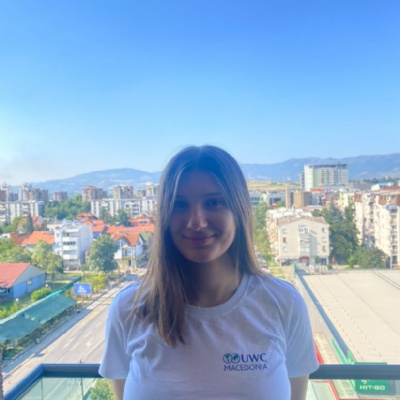Elena Zhakov

knows herself
Once the question of what is answered, Elena does not stop; instead continuing with the why. This allows her to reach deep and understand the complex interactions and relationships in the world, including understanding the people in her life. She understands why she is how she is – in what way has her family shaped her, how her reading habit formed due to her father, what’s the effect of Macedonia’s society is on her worldview, and even how learning languages like French has prompted her to appreciate Macedonian even more. During our conversation this summer, she emphasized that most of the personality traits of human beings can be traced back to influences in the first 7 years of their life. It is thus rather fitting that Elena aims to help other people to gain such a “self-understanding” – she wants to be a psychotherapist.
A natural consequence of this feature of Elena is that she strongly appreciates the people around her, as well as the environment. She revealed that before departing to the Netherlands, she’ll host a final goodbye party with friends and family (in a true Macedonian way – in a kafana!) and will ensure to say a proper goodbye to everyone. Similarly, she values the time spent in Macedonia, which is obvious to me from the joy with which she describes its natural wonders – she even has a plan to tour the entire country with friends. Elena believes in her commitment to remain connected to the Macedonian language even from abroad, and considers this a responsibility for everyone.
Nonetheless, I haven’t even started to describe one of Elena’s main qualities – she strongly gravitates towards analyzing various aspects of society, and thus forms unique (often strong) opinions. During our conversation, with pragmatic maturity she described the (un)importance of student councils in the real decision-making of schools, despite herself having experience with successful initiatives while she was a member. In addition, almost on the fly she critically analyzed media practices which are designed to incite an emotional reaction in viewers. Previously, she had enriched her selection interviews by carefully explaining demographic trends and describing the epistemological superiority of surveys as a key component in academic psychology research. Elena has figured out the interdependence between the one and the many – her self-knowledge and knowledge about society are symbiotically connected.
With the approach of the day of her departure to UWC Maastricht – the college I graduated from – it is beyond clear to me that Elena has the same conversations in her everyday life that I remember from conferences in Maastricht. For this reason, I am excited for the new stages in personal development ahead of Elena in an environment designed to encourage them.
Ilija, August 2022
